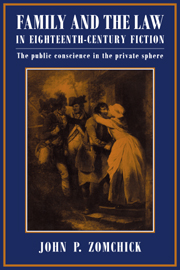Book contents
- Frontmatter
- Contents
- Preface
- Acknowledgments
- 1 Introduction
- 2 Roxana's contractual affiliations
- 3 Clarissa Harlowe: caught in the contract
- 4 Tame spirits, brave fellows, and the web of law: Robert Lovelace's legalistic conscience
- 5 Roderick Random: suited by the law
- 6 Shadows of the prison house or shade of the family tree: Amelia's public and private worlds
- 7 The embattled middle: longing for authority in The Vicar of Wakefield
- 8 Caleb Williams: negating the romance of the public conscience
- Bibliography
- Index
5 - Roderick Random: suited by the law
Published online by Cambridge University Press: 10 February 2010
- Frontmatter
- Contents
- Preface
- Acknowledgments
- 1 Introduction
- 2 Roxana's contractual affiliations
- 3 Clarissa Harlowe: caught in the contract
- 4 Tame spirits, brave fellows, and the web of law: Robert Lovelace's legalistic conscience
- 5 Roderick Random: suited by the law
- 6 Shadows of the prison house or shade of the family tree: Amelia's public and private worlds
- 7 The embattled middle: longing for authority in The Vicar of Wakefield
- 8 Caleb Williams: negating the romance of the public conscience
- Bibliography
- Index
Summary
Arbitrary power, in all cases, is somewhat oppressive and debasing; but it is altogether ruinous and intolerable, when contracted into a small compass … A people, governed after such a manner, are slaves in the full and proper sense of the word.
David Hume, “Of the Rise and Progress of Arts and Sciences”Introduction
In theory England is free of the arbitrary power that David Hume describes in the epigraph to this chapter. Not only do publicly promulgated laws promise freedom from the arbitrary whims of a ruler, but the law itself is a familiar part of the lived experience of the people of eighteenth-century England, from what Alan Harding calls the “amateur justice and the courts of local communities,” to “the macabre carnival of the public hanging,” as Roy Porter notes. As a part of culture, law – in its ideal state – constitutes the grounds upon which all can consent to the exercise of social authority. The very need for consent, however, illustrates that English society is still divided into the governed and the governing, those subject to power and the wielders of that power. Even though the local Justice of the Peace, swears to “do equal right to the poor and to the rich, after [his] cunning, wit, and power, and after the laws and customs of the realm, and statutes thereof made,” his dispensation of justice depends upon how his cunning and wit apply the statutes and customs of the realm to those who fall within his jurisdiction.
- Type
- Chapter
- Information
- Family and the Law in Eighteenth-Century FictionThe Public Conscience in the Private Sphere, pp. 105 - 129Publisher: Cambridge University PressPrint publication year: 1993



